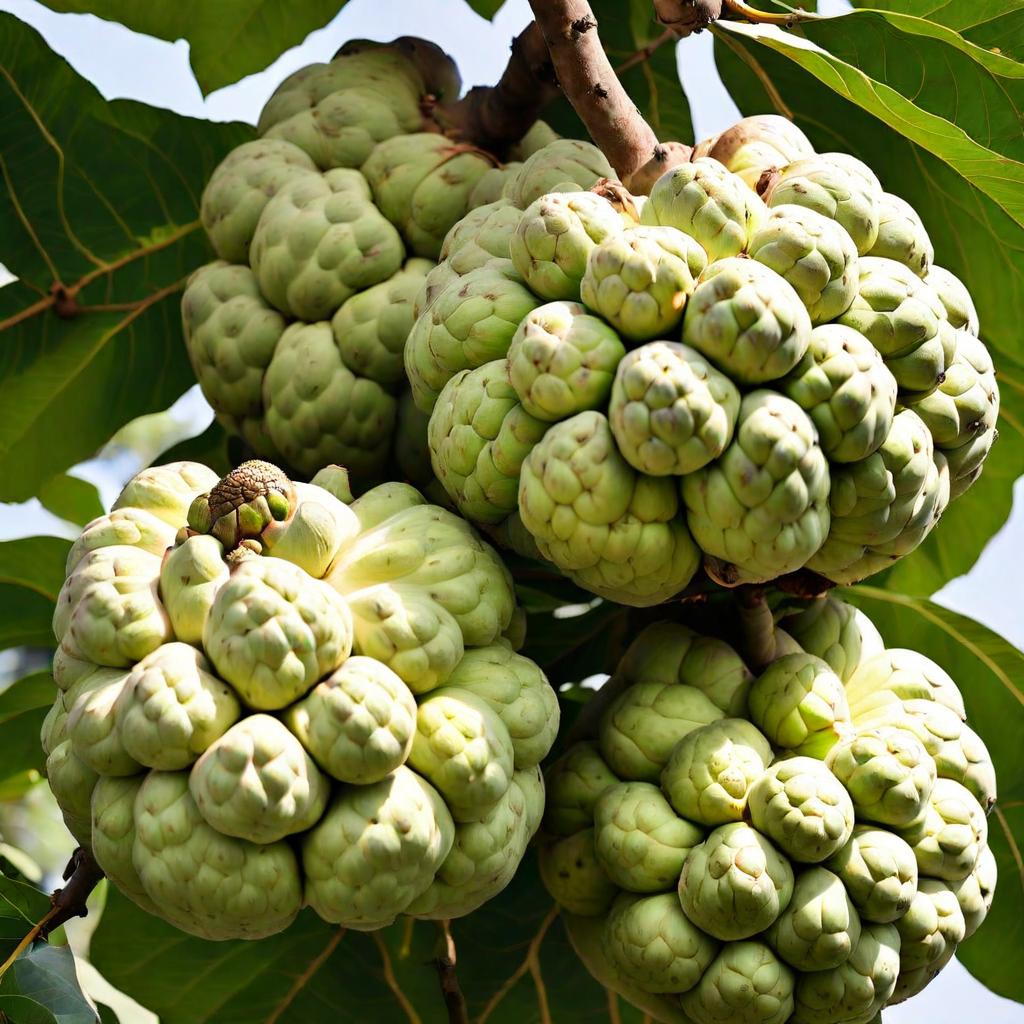“Discover the sweet delight of custard apple: a tropical fruit celebrated for its creamy texture and unique flavor.”

Table of Contents
1) What is Custard Apple?
This fruit is also known as Annona reticulata, is a tropical fruit known for its sweet, creamy flesh.
2) Nutritional Profile:
Here’s a breakdown of the nutrients of this fruit :
Macro-Nutrients:
| Macro-Nutrients | Value |
| Calories | 94 kcal |
| Carbohydrates | 23.6 g |
| Sugars | 14.5 g |
| Dietary Fiber | 4.4 g |
| Protein | 2.1 g |
| Fat | 0.6 g |
Vitamins:
| Vitamins | Daily Value |
| Vitamin C | 19.2 mg |
| Vitamin B6 | 0.2 mg |
| Vitamin A | 5 IU |
Minerals:
| Minerals | Daily Value |
| Calcium | 30 mg |
| Magnesium | 18 mg |
| Potassium | 247 mg |
| Iron | 0.6 mg |
Custard apples are nutritious and delicious, offering a good source of vitamins and minerals.
3) Health Benefits of Custard Apple:
Here are some health benefits of custard apple:
1) Rich in Antioxidants:
- Reduces oxidative stress and helps fight free radicals(A type of unstable molecule that is made during normal cell metabolism).
2) Boosts Immunity:
- It is rich in Vitamin C which helps in boosting of immune system.
3) Helps in Digestion:
- Dietary fiber promotes healthy digestion and prevents constipation.
4) Supports Heart Health:
- Potassium helps regulate blood pressure and heart function.
5) Improves Vision:
- Contains nutrients that support eye health.
6) Enhances Skin Health:
- Antioxidants and vitamins help maintain healthy skin.
7) Supports Bone Health:
- Provides calcium and magnesium, important for strong bones.
Custard apples are a nutritious addition to a balanced diet.
4) Risks and Considerations:
Here are some risks and considerations for custard apple:
1) Allergic Reactions:
- Some people may experience allergies such as itching or swelling.
2) High Sugar Content:
- Contains natural sugar but the one who have diabetics must consume custard apple in limit.
3) Seeds:
- Seeds are inedible(you cannot eat it) and can be toxic if crushed or chewed.
4) Caloric Content:
- High in calories, so portion control is important for weight management.
5) Ripeness:
- Unripe fruit can be astringent and difficult to digest.
6) Pregnancy and Breastfeeding:
- Generally safe, but consult a healthcare provider for personalized advice.
Always enjoy custard apples as part of a balanced diet.
5) Facts:
Here are some interesting facts about custard apple:
1) Scientific Name:
- Annona reticulata
2) Common Names:
- Also known as bullock’s heart or sugar apple.
3) Origin:
- Native to the tropical Americas.
4) Flavor:
- Sweet, creamy texture similar to custard.
5) Cultivation:
- Grows best in warm, tropical climates.
6) Nutrient-Rich:
- High in vitamins C and B6, and minerals like potassium and magnesium.
7) Culinary Uses:
- Eaten fresh or used in desserts and smoothies.
8) Cultural Significance:
- Valued in traditional medicine for its health benefits.
Custard apples are cherished for their unique taste and nutritional value.
6) Myths:
Here are some common myths about custard apple:
1) Cures All Illnesses:
- It’s highly nutritious but it doesn’t mean that it can cure all diseases.
2) Leads to Weight Gain:
- Excessive consumption of custard apple contributes in weight gain.
3) Toxic Fruit:
- The fruit itself is safe, but seeds should not be consumed.
4) Raises Blood Sugar Drastically:
- Contains sugars, but can be eaten in moderation by diabetics with proper management.
5) Only Grows in the Wild:
- Cultivated in many tropical regions worldwide.
Custard apples are beneficial when enjoyed as part of a balanced diet.
FAQS:
1) What is custard apple good for?
This fruit contains polyphenolic compounds that help to fight against certain chronic conditions, including cancer, diabetes, cardiovascular issues, and neurodegenerative conditions. Custard fruits also contain essential oils, which, when extracted, have antiparasitic and antimalarial properties.
2) Is custard apple for diabetes?
This fruit is highly recommended for people with diabetes because of its high fiber content. It can help you regulate your blood glucose levels by slowing down the absorption of sugar into your bloodstream. Being high in fiber, they can keep you full for a longer time and help you curb your hunger pangs.
3) What are the side effects of custard apple?
Consuming too many of these fruits all at once can result in surplus body fat and unhealthy weight gain. Moreover, the skin and mainly the seeds of sitaphal contain toxic compounds that can lead to grave complications of redness, allergies in the skin and damage to the eyes.
4) Is custard apple Indian fruit?
This fruit (Annona squamosa) is also known as sugar-apple, sweetsop, and is popular across India as sitaphal /Seetha Palam/sharifa (Annona reticulate). It is native to South America, West Indies and parts of Asia. This fruit bears a hard, pale green exterior with jagged projections and is soft and creamy inside.
My Top Articles Check Out Now:
https://taazafruithub.com/apple-fruit-health-benefits-2024/
https://taazafruithub.com/acerola-fruit-health-benefits-2024/
https://taazafruithub.com/blueberry-fruit-health-benefits-2024/
https://taazafruithub.com/avocado-fruit-health-benefits-2024/